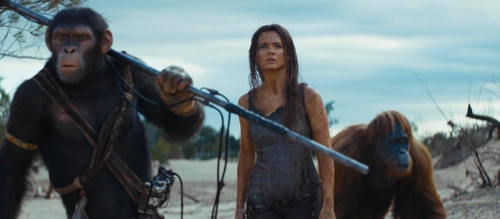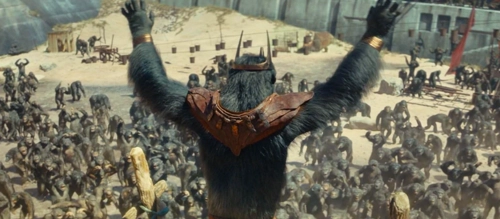
Kingdom of the Planet of the Apes (2024)
Director: Wes Ball
Screenwriters: Josh Friedman
Starring: Owen Teague, Freya Allan, Kevin Durand, Peter Macon, William H. Macy, Lydia Peckham, Travis Jeffery, Sara Wiseman, Neil Sandilands, Eka Darville
56 years ago, the ridiculously successful sci-fi franchise Planet of the Apes began, and with the arrival of its tenth instalment, Kingdom of the Planet of the Apes, it shows no sign of slowing down. The most recent trilogy, headed by Andy Serkis, updated the socio-political commentary and utilised Weta Digital’s world-beating performance capture visual effects to bring the titular simians to life, but can this franchise continue to captivate and to innovate as it heads towards its sixth decade and beyond?
Hundreds of years after the passing of ape liberator Caesar, young chimp Noa’s (Owen Teague) coming-of-age ceremony is cut short by the violent attack on his village by a rival tribe. Along with an unusually intelligent human (Freya Allan), Noa must travel into enemy territory and confront their leader Proximus (Kevin Durand) with the hope of freeing his friends and family.
You’d think from the above synopsis that this story is a fairly simple and stripped-back quest movie, but director Wes Ball (The Maze Runner) and screenwriter Josh Friedman (Avatar: The Way of Water) sure do take a circuitous route in telling it.
The film starts strongly enough. After a brief prologue linking events to the previous trilogy, the opening scene takes in a stunning vista of tree-covered skyscrapers as three young apes (Teague as Noa bringing a sparky and playful dynamic with Lydia Peckham’s Soona and Travis Jeffrey’s Anaya) make a tough climb to retrieve eagle eggs to rear as the latest generation of their tribe’s trained hunting animals. A big thing is made of the birds of prey and their importance to this particular group of “Eagle Clan” apes and our new protagonist Noa is of course the son of the head bird-wrangler and has certain expectations foisted on him. At this point it is unclear whether other ape clans have incorporated different predatory animals from their immediate environs into their way of life, but it’s clear from the start that the eagles (slightly less convincingly realised than the apes) will become a convenient plot device as required.
After an inciting incident that separates Noa from his tribe long enough for them to be raided and taken prisoners, our hero falls in with Freya Allan’s human who is known at first as Nova (referencing the original 1968 film) and Peter Macon as Rakka, a warm and good-natured orangutan priest who teaches him about Caesar and provides the film with a much-needed sense of humour for a spell.
You’re certainly given the time to soak up this incredibly tactile, nature-reclaiming-man’s world environment, and everyone’s performance-captured micro-expressions help to ensure the verisimilitude of every impossibly detailed photo-real image, but what drives this new crop of characters beyond the basic need to survive is somewhat lost behind the dazzling visuals. Everything in the film’s middle act feels like an unnecessary side-quest, like we’re killing time before the story convention says we’re allowed to confront the big bad.

Speaking of which, things definitely pick up at about the halfway point with the arrival of Proximus Caesar, a human tech-obsessed bonobo dictator performed by Kevin Durand like he’s always projecting to the cheap seats in a theatre in the best possible way. Proximus’ relatively limited screentime is so entertaining that you’re left wishing we spent more time with him and his delusions of grandeur rather than our fairly standard-issue heroes.
There are many questions left unanswered about this new Apes era which are intriguing if they end up powering future sequels, but these could turn out to be more annoying if the answers have simply been glossed over by the filmmakers. This is the first instalment of the series without a strong human presence – our species has largely become feral and lives in the wilderness but is yet to take its place as domestic slaves to the learned apes. There is only one other prominent human character in the film, Trevathan (William H. Macy), who provides Proximus’ thugs with human weapons and the self-proclaimed Caesar with stories of great leaders from history, but, unlike Freya Allan’s character, his superior intelligence relative to his regressed species seems to be without explanation.
At another point it looks like we’re going to get a commentary on the misuse of religion and revisionist history by totalitarian leaders around the world, with Rakka passing down stories from many generations ago to inspire the young, and Proximus using them as an excuse to become the biggest, baddest ape around, but the idea withers on the vine in favour of more (admittedly impressive) spectacle involving a lot of CG water in the final act. Matt Reeves’ two Apes films especially could articulate quite complex philosophical ideas with few words and telling symbolism, but it doesn’t look like Wes Ball is quite on this level as a director just yet.
If the films from the 1970s were all to one degree or another an allegory for civil rights issues and cold war paranoia, and last decade’s trilogy was about humanity’s fractious relationship with the natural world and our tendency for self-destruction, then there is plenty of new ground for future Apes movies to cover thematically, because we as a species certainly aren’t improving.
Beyond a need for streamlining in the screenplay to make it a little less unwieldy and a stronger narrative throughline overall, there’s not a lot wrong with Kingdom of the Planet of the Apes. It looks fantastic and moves the story forward a fair distance from Caesar’s time of revolution towards the state of things when Charlton Heston first landed his spacecraft on an apparently alien planet all those years ago. Individual moments stand out, but what we do perhaps lack is any one character as compelling as Serkis’ Caesar or even Heston’s Taylor. At least early signs are good that Owen Teague – who was inspired by Andy Serkis’ performance capture work to take up acting – and company have the talent to evolve their ape roles at the same rate that the VFX continue to come along leaps and bounds
Score: 15/24

